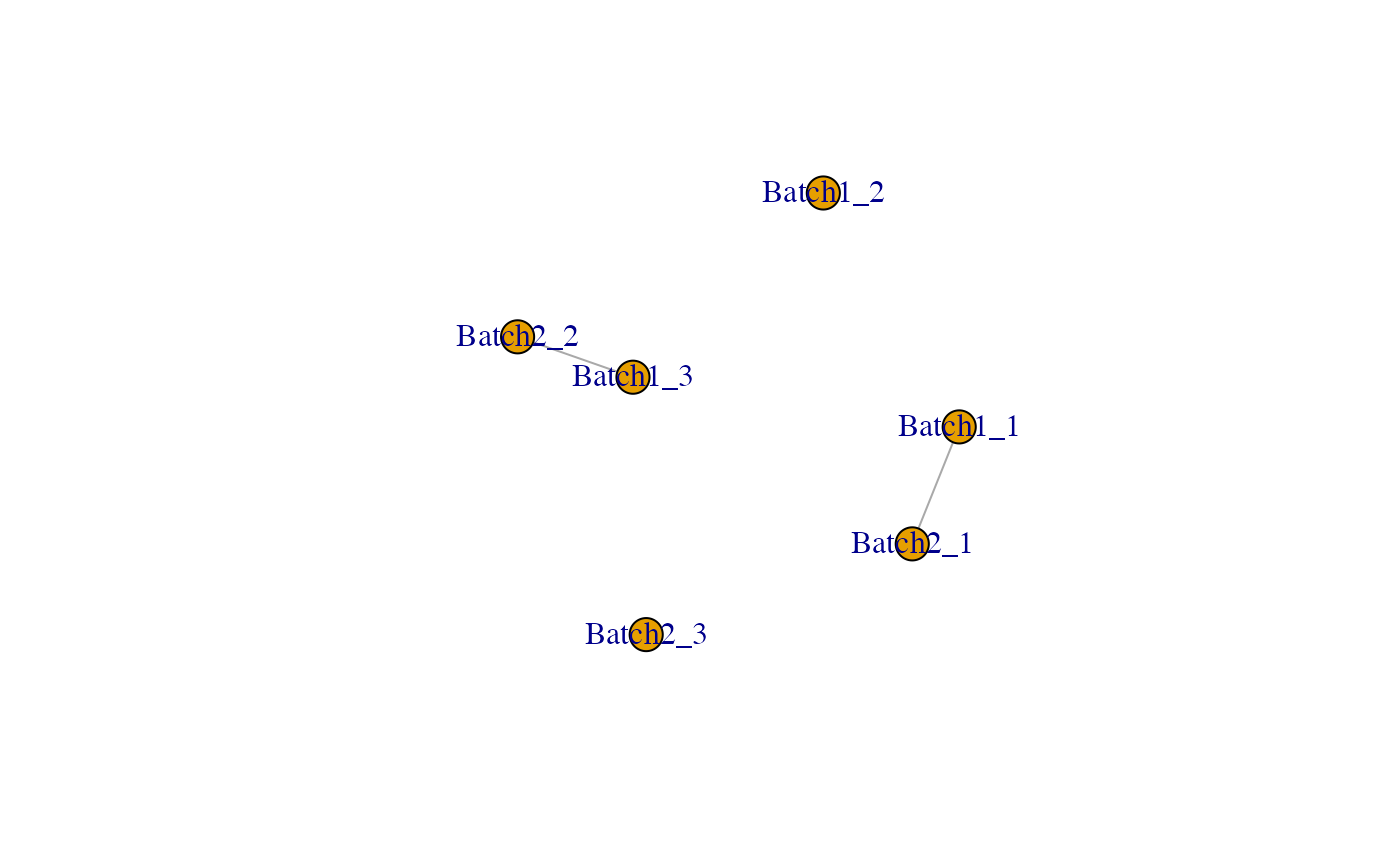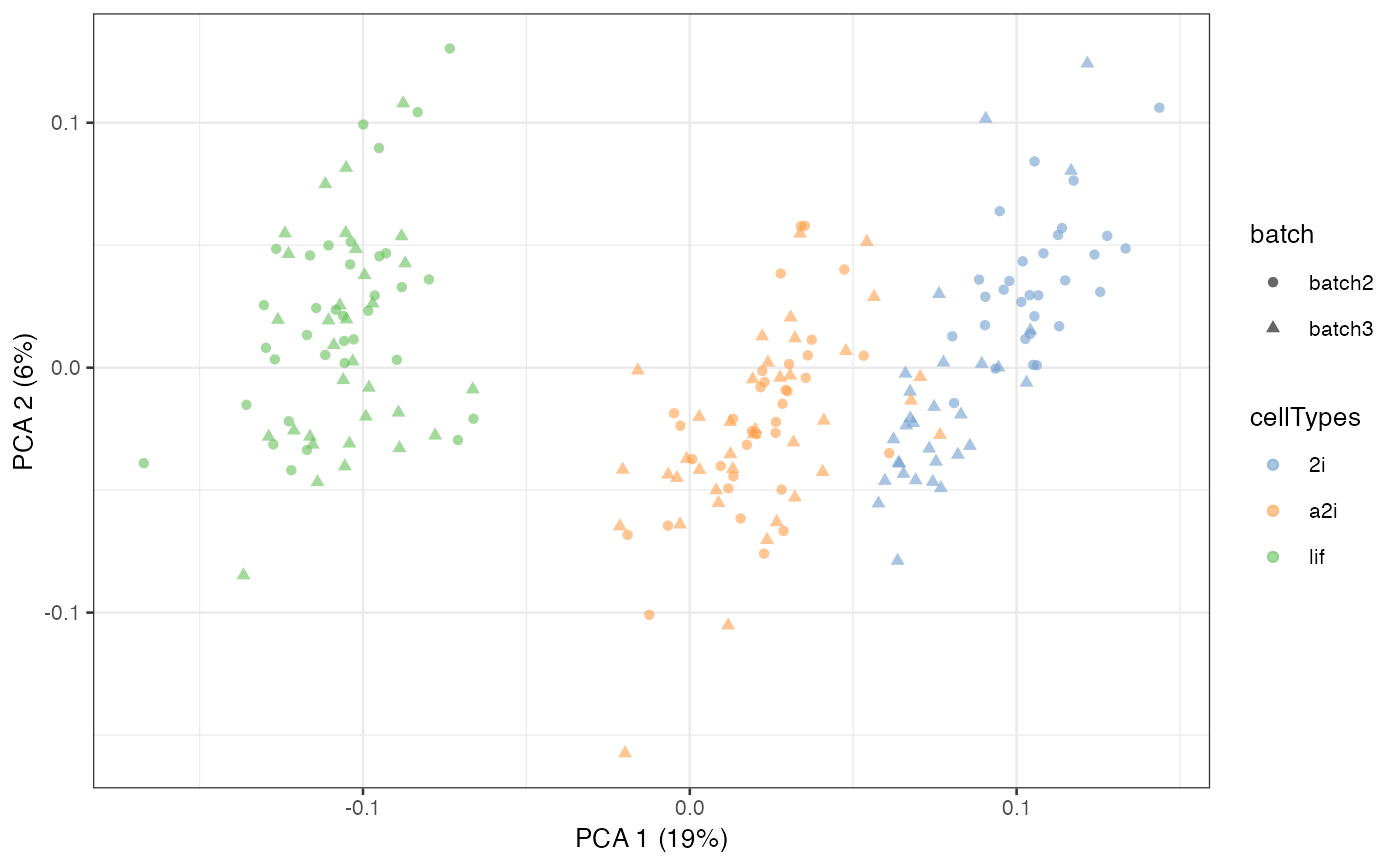Merge single-cell data from different batches and experiments leveraging (pseudo)-replicates, control genes and pseudo-bulk.
scMerge2(
exprsMat,
batch,
cellTypes = NULL,
condition = NULL,
ctl = rownames(exprsMat),
chosen.hvg = NULL,
ruvK = 20,
use_bpparam = BiocParallel::SerialParam(),
use_bsparam = BiocSingular::RandomParam(),
use_bnparam = BiocNeighbors::AnnoyParam(),
pseudoBulk_fn = "create_pseudoBulk",
k_pseudoBulk = 30,
k_celltype = 10,
exprsMat_counts = NULL,
cosineNorm = TRUE,
return_subset = FALSE,
return_subset_genes = NULL,
return_matrix = TRUE,
byChunk = TRUE,
chunkSize = 50000,
verbose = TRUE,
seed = 1
)Arguments
- exprsMat
A gene (row) by cell (column) log-transformed matrix to be adjusted.
- batch
A vector indicating the batch information for each cell in the batch-combined matrix.
- cellTypes
An optional vector indicating the cell type information for each cell in the batch-combined matrix. If it is
NULL, pseudo-replicate procedure will be run to identify cell type.- condition
An optional vector indicating the condition information for each cell in the batch-combined matrix.
- ctl
A character vector of negative control. It should have a non-empty intersection with the rows of exprsMat
- chosen.hvg
An optional character vector of highly variable genes chosen.
- ruvK
An integer indicates the number of unwanted variation factors that are removed, default is 20.
- use_bpparam
A
BiocParallelParamclass object from theBiocParallelpackage is used. Default is SerialParam().- use_bsparam
A
BiocSingularParamclass object from theBiocSingularpackage is used. Default is RandomParam().- use_bnparam
A
BiocNeighborsParamclass object from theBiocNeighborspackage is used. Default is AnnoyParam().- pseudoBulk_fn
A character indicates the way of pseudobulk constructed.
- k_pseudoBulk
An integer indicates the number of pseudobulk constructed within each cell grouping. Default is 30.
- k_celltype
An integer indicates the number of nearest neighbours used in
buildSNNGraphwhen grouping cells within each batch. Default is 10.- exprsMat_counts
A gene (row) by cell (column) counts matrix to be adjusted.
- cosineNorm
A logical vector indicates whether cosine normalisation is performed on input data.
- return_subset
If
TRUE, adjusted matrix of only a subset of genes (hvg or indicates inreturn_subset_genes) will be return.- return_subset_genes
An optional character vector of indicates the subset of genes will be adjusted.
- return_matrix
A logical value indicates whether the adjusted matrix is calculated and returned.
- byChunk
A logical value indicates whether it calculates the adjusted matrix by chunk
- chunkSize
A numeric indicates the size of the chunk. If
FALSE, then only the estimated parameters will be returned.- verbose
If
TRUE, then all intermediate steps will be shown. Default toFALSE.- seed
A numeric input indicates the seed used.
Value
Returns a list object with following components:
newY: if
return_matrixisTRUE, the adjusted matrix will be return.fullalpha: Alpha estimated from the fastRUVIII model.
M: Replicate matrix.
Examples
## Loading example data
data('example_sce', package = 'scMerge')
## Previously computed stably expressed genes
data('segList_ensemblGeneID', package = 'scMerge')
## Running an example data with minimal inputs
library(SingleCellExperiment)
exprsMat <- scMerge2(exprsMat = logcounts(example_sce),
batch = example_sce$batch,
ctl = segList_ensemblGeneID$mouse$mouse_scSEG)
#> [1] "Cluster within batch"
#> Warning: You're computing too large a percentage of total singular values, use a standard svd instead.
#> Warning: You're computing too large a percentage of total singular values, use a standard svd instead.
#> [1] "Normalising data"
#> [1] "Constructing pseudo-bulk"
#> Dimension of pseudo-bulk expression: [1] 1047 131
#> [1] "Identifying MNC using pseudo-bulk:"
 #> [1] "Running RUV"
assay(example_sce, "scMerge2") <- exprsMat$newY
example_sce = scater::runPCA(example_sce, exprs_values = 'scMerge2')
scater::plotPCA(example_sce, colour_by = 'cellTypes', shape = 'batch')
#> [1] "Running RUV"
assay(example_sce, "scMerge2") <- exprsMat$newY
example_sce = scater::runPCA(example_sce, exprs_values = 'scMerge2')
scater::plotPCA(example_sce, colour_by = 'cellTypes', shape = 'batch')
